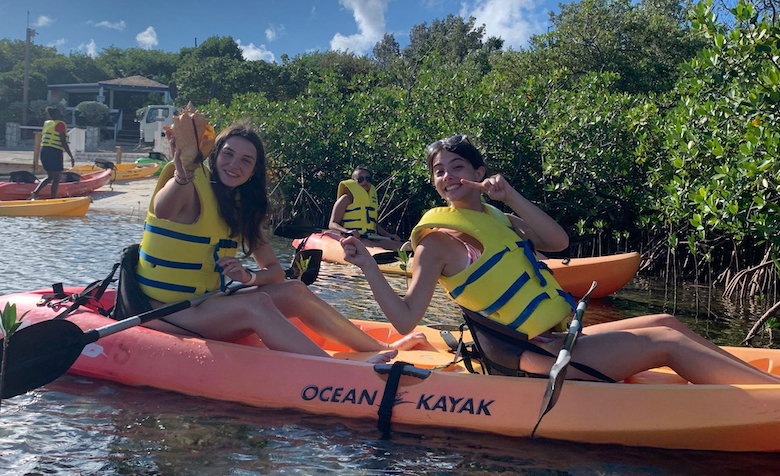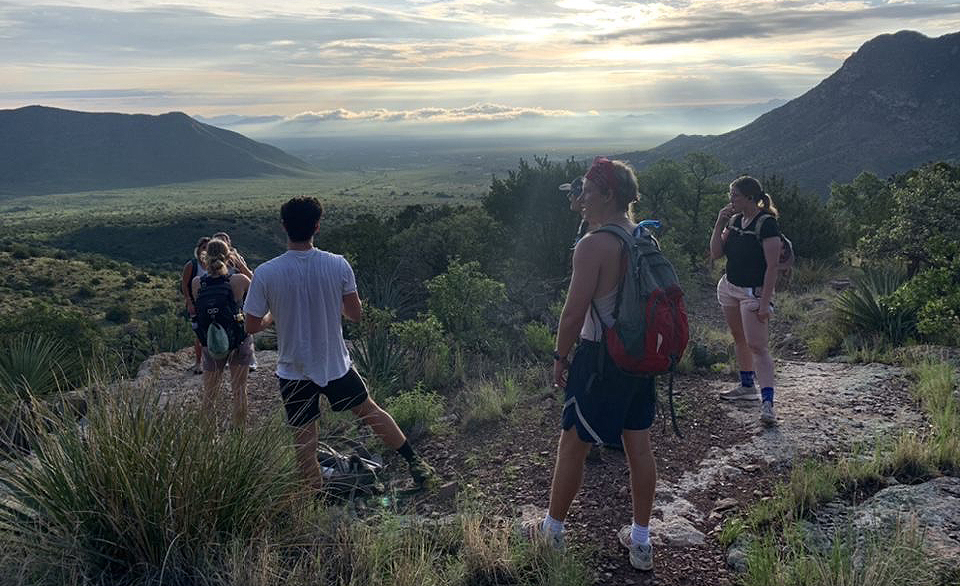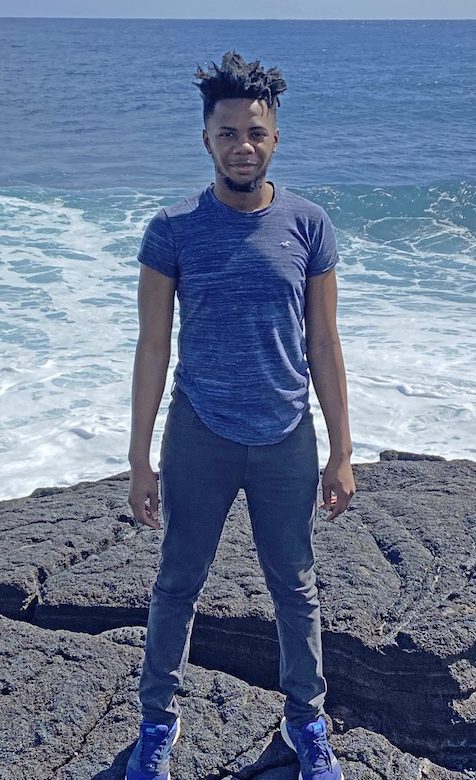Off-campus courses give students hands-on opportunities in biodiversity locations

Abby Morgan (left), a senior biology major from Tullahoma, Tennessee, and Bridget Sprandel, a junior biology major from Crystal Lake, Illinois, show off a live conch they discovered while exploring an estuary on the Bahamian island of Half Moon Cay. The UM students participated in an Island Biogeography course in the Caribbean during the 2022 Wintersession. Submitted photo
AUGUST 3, 2022 BY STAFF REPORT
Biological science students at the University of Mississippi are broadening their horizons by taking classes in the Caribbean, Hawaii and Arizona, taught by professors Brice Noonan, Erik Hom and Jason Hoeksema.
“The Department of Biology is fortunate to have a number of off-campus opportunities that allow students to explore such varied topics as the biodiversity of the desert southwest in Arizona and the interaction of biology and society in Hawaii,” said Noonan, acting chair and associate professor of biology.
Hoeksema’s BISC 380 and 491: Ecology and Evolution of Sky Island Biodiversity course in Arizona is offered over the summer, and Noonan’s BISC 448: Island Biogeography in the Caribbean and Hom’s BISC 380: Life at the Interface; Microbes, Volcanoes and Culture in Hawaii are Wintersession courses.
“To me, the best thing about this class is that southeastern Arizona is a major biodiversity hotspot with a beautiful landscape, making it the ideal outdoor laboratory for learning about species in their natural environments,” Hoeksema said.
“Students are immersed in nature, learning to recognize species and how they fit into their characteristic habitats while hiking and exploring in an outdoor wonderland of mountains and canyons.”

Students in professor Jason Hoeksema’s Ecology and Evolution of Sky Island Biodiversity course catch their breath and take in the view during a hike in the Chiricahua Mountains of Arizona. Photo by Jason Hoeksema/UM Department of Biology
Meredith Goza, a biology major from Oxford, participated in the Arizona class.
“Every day, we explored the habitat we were studying, documenting the interesting plants or animals we found,” Goza said. “We conducted small research projects; mine was investigating the concentration of different species of bats throughout the region.
“All aspects of this course offered enjoyable and direct approaches to exploring science.”
Through travel and study both inside and outside the U.S., students gain a more holistic view of the field of biology beyond campus classrooms.
“I believe training young scientists and researchers is much more a journeyman experience than most people realize, one that is poorly captured by traditional lecture-lab courses,” Hom said.
“The type of field courses I have led to California and Hawaii for StudyUSA emphasize ‘experiential learning’ – on-the-spot critical thinking combined with hands-on practice – and has excited students without fail that they are ‘doing science.’ Having students ‘do science’ is precisely the goal of my field courses.
“Teaching students in a beautiful but unfamiliar environment helps a lot with meta-cognition, helping them to see science in a different and more culturally far-reaching context.”
Recent biology graduate Jaylen Powell, from Lambert, is working in Hom’s laboratory as a technician to gain more skills before graduate school. He enrolled in the Hawaii course because of a talk with Hom.

Jaylen Powell, a recent UM biology graduate from Lambert, stands on lava rock overlooking the Pacific Ocean while in Hawaii for a 2020 Study USA course on Life at the Interface; Microbes, Volcanoes and Culture. Submitted photo
“It was my junior year and I did not know what I wanted to do with my life,” Powell said. “Dr. Hom explained that I should step out of my comfort zone and gain a new perspective. After much deliberation and reassurance that airplanes are safe, I decided he was right.
“The Hawaii experience was everything Dr. Hom had said it would be and more. It was an engaging class, from listening to professors to harvesting tea leaves. My top memorable moments: visiting a honey farm and learning about bees, and when the class went snorkeling, I was pushed out of my comfort zone and it made me want to learn how to swim.”
For Noonan’s Island Biogeography class, 13 students explored jungles in Jamaica, forests on St. Thomas and coastal communities of the Bahamas, observing biological communities and learning about how their geography affected them.
Tiffany Nguyen, from Indianola, called the class her “favorite memory at Ole Miss.” She enrolled in the class to study abroad and to fulfill a biology elective for her biochemistry major, which she completed by earning her bachelor’s degree in May.
“During winter intersession, it was nice to have a small break and focus on one class,” Nguyen said. “We would have a two-hour class on ship days, and on island days we would have our ‘lab’ where we hiked around the islands to find species and study the islands. I tried to live in the moment and appreciate all of it.
“Dr. Noonan was really, really passionate about the class, so it made it 10 times more enjoyable. It’s such a small class, you get to know one another because you spend most of your time on the ship with your classmates. I made some of my best friends on this trip.”
